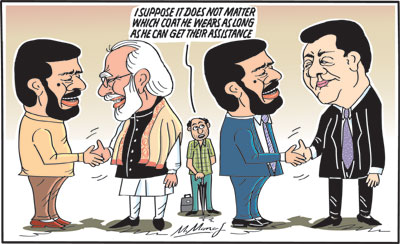Columns
The formidable challenge of balancing relations with China and India
View(s):The government faces two formidable challenges: balancing Sri Lanka’s relations with China and India and balancing the budget for 2025.
Today we discuss the formidable challenge of balancing relations with China and India, while the budget for 2025 will be discussed after its presentation next month.
Balancing act
The antagonistic character of the Sino-Indian relations makes Sri Lanka’s policy of friendship and dependence on both powerful neighbours an extremely difficult balancing act. India views our close economic links with the People’s Republic of China with suspicion and mistrust. This is especially so in respect of China’s access to Sri Lanka’s sea, which India considers as a vital security concern.
Agreement
The recent Sri Lankan agreement with China on 15 collaborative projects, especially the Sinopec investment in an oil refinery in Hambantota, appears to have caused apprehensions in India. This is clear from the reactions of the Indian media after President Anura Kumara Dissanayake’s China visit and the government’s announcement of 15 collaborative projects with China. The Sinopec investment in an oil refinery in Hambantota, where the Chinese have a port, appears to be a severe irritant to India.
Media
The Indian media, which was quite euphoric about our president choosing to make the Indian visit his first, has downplayed the president’s China visit. In fact, India is very concerned about it. The balancing of our relationships with the two neighbouring giants has become more difficult.

However, maintaining friendly relations with both countries is imperative.
First visit
The fact that President Dissanaike chose to make his first foreign visit to India was hailed as a significant diplomatic triumph by the Indian media. It was interpreted as Sri Lanka’s leaning towards its closest neighbour or big brother.
Projects
The several Indian investment projects in Sri Lanka were considered a closer dependence of the Island on India and celebrated as a diplomatic success. This was especially so owing to the JVP’s anti-Indian attitude before. However, the Indian euphoria was short-lived when Colombo announced a state visit to China by Sri Lanka’s president.
China visit
The president’s China visit, a month after returning from India, has been seen unfavourably by the Indian press. This is especially owing to the 15 economic agreements signed between the two countries. The agreement for Sinopec to establish an oil refinery in Hambantota, near the Hambantota Port, has no doubt evoked much displeasure.
Debt trap
These Chinese development projects and economic collaboration are characterised as Chinese “debt trap diplomacy” by India. However, these infrastructure projects have the potential to benefit the Island’s economy. This is in contrast to the several “white elephants” that a previous government wanted China to build.
Economic benefit
It is vitally important for the Sri Lankan economy to benefit from the economic projects without offending India. It is important to remind those critical of the Chinese ventures that India too has important investments in Sri Lanka such as the Trincomalee oil farms and wind power projects, among others.
This concern highlights the delicate balance Sri Lanka must maintain in its foreign relations, particularly between two major powers. By emphasising mutual benefits and investments, Sri Lanka can foster cooperation while safeguarding its economic interests.
The bottom line is that economic projects should not be tainted by geopolitical considerations. Sri Lanka faces a tough task in performing a balancing act vis-à-vis the two large and powerful countries that are suspicious of each other.
Oil refinery
This concern has been balanced by the announcement that Sri Lanka is discussing building an oil refinery as a joint venture with India.
The collaboration with India is to use the large number of oil tanks in Trincomalee. Of the 99 tanks originally built by the British during World War II at the Trincomalee port, 61 are under a Sri Lanka-India joint venture. The tanks could hold 610,000 metric tonnes and were capable of holding oil and refined products, far more than the country’s requirements.
President Dissanayake said that discussions were underway to utilise the oil tanks in Trincomalee to become “a nation that exports fuel to the world.”
Geopolitics
The geopolitics of the Sino-Indian relations makes Sri Lanka’s policy of friendship with both powerful neighbours an extremely difficult balancing act. India and China view our close economic links with each other as a security threat.
India views China’s access to Sri Lanka’s seas as a threat to India’s security. The recent agreement on 15 collaborative projects with China, especially the Sinopec investment in an oil refinery in Hambantota, is viewed as a threat to India’s maritime security.
Conclusion
The pertinent issue is whether these attempts of ours to balance the relations with India and China will satisfy the two countries. Owing to India’s proximity to Sri Lanka, its security concerns cannot be brushed aside. The strategic importance of Sri Lanka makes the two giant neighbours of ours look at each other with suspicion.
The success of the government in balancing our relationships with China and India is of paramount importance for the country’s future. However, their hostile relationships with each other make Sri Lanka’s neutrality a difficult task to maintain.
Astute diplomatic skills are needed for us to steer us through these complex and troubled waters. Undoubtedly, the outcome of our negotiations with these two powerful nations would have far-reaching consequences for the country.
Buying or selling electronics has never been easier with the help of Hitad.lk! We, at Hitad.lk, hear your needs and endeavour to provide you with the perfect listings of electronics; because we have listings for nearly anything! Search for your favourite electronic items for sale on Hitad.lk today!


Leave a Reply
Post Comment